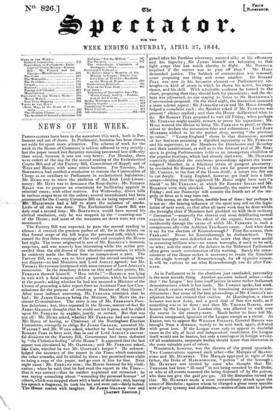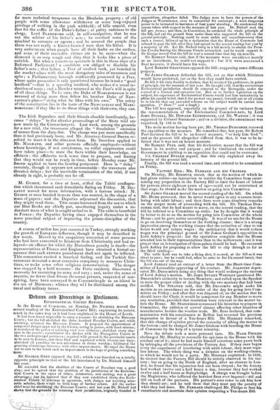As in Parliament so in the elections just concluded, personality
is the most notable thing. Another question indeed arises—whe- ther " the League" has done itselfjustice in some rather indiscreet demonstrations which it has made. Mr. COBDEN spoke, last week, as if much caution would be used in introducing strangers to con- stituencies; but some of the late proceedings of Mr. COBDEN'S co- adjutors have not evinced that caution. At Huntingdon, a clever lecturer was sent down, and a good deal of fuss was made, as if something was to be done ; and then Mr. Turmas BARING, once beaten by the League in London city, was allowed to walk over the course in the country-town. Much better to have left Mr. BARING unopposed, ignorant of the League except as a victor. At Exeter, too, to oppose Sir WILLIAM FOLLETT, General BRIGGS was brought from a distance, merely to be sent back again, defeated with great loss. If the League were only to appear in doubtful cases as the ally of local and independent candidates, the League itself would not be beaten, but only a contingent in foreign service. Of all combatants, corporate bodies should know that discretion is the more valuable part of valour. Woodstock, however, was the theatre of the grand spectacle. Two Conservatives opposed each other—the Marquis of BLAND- FORD and Mr. Humraer. The Marquis appeared in right of his father, the Duke of MARLBOROUGH, " patron " of the borough ; Mr. HUMFREY was invited by some who thought that Mr. THESIGER had been "ill-used" in not being reseated by the Duke, or who at all events resented the being disposed of by the patron, who does not give the quid pro quo. All the discussion turned on that. Mr. HustraEr made a most extraordinary attack upon the owner of Blenheim; against whom he charged a great many specifie acts of petty tyranny and shabbiness,—stories of men sent to prison for mere technical trespasses on the Blenheim property ; of old people with some allowance withdrawn or some long-enjoyed privilege of walking in the park 'withheld; of bills unpaid, even that for the coffin of the Duke's father ; of paltry rudeness to the clergy. Lord BLANDFORD said, in self-exculpation, that be was not the arbiter of his father's acts ; he ascribed some of the mischief to servants or agents ; and he assured the people that there was not really a kinder-hearted man than his father. It is very unfortunate when people have all their faults on the surface, and none of their recondite virtues are to be seen—when the diamond is so very rough and dirty that it looks like a piece of rubbish. But what a monstrous spectacle is this in these days of a Reformed Parliament ! a candidate son obliged to disclaim his father's acts ; that fitt her, a Peer of exalted rank, yet bearded in the market-place with the most derogatory tales of meanness and spite ; a Parliamentary borough confessedly possessed by a Peer, whose quiet possession is only questioned because he is not a "good landlord"—that is, a spending landlord, mho makes the usual re- duction of rents ; and a Member returned at the Peer's will in spite of all those things. To be sure, the Duke of MARLBOROUGH is not accused of doing more than follow his brother Duke of NEW.. CASTLE'S plan—" doing what he likes with his own." The safety of the constitution lies in the taste of the NEwcasTcEs and MARL- Boum:tons : if they like to do these things with their own, they can.



























 Previous page
Previous page